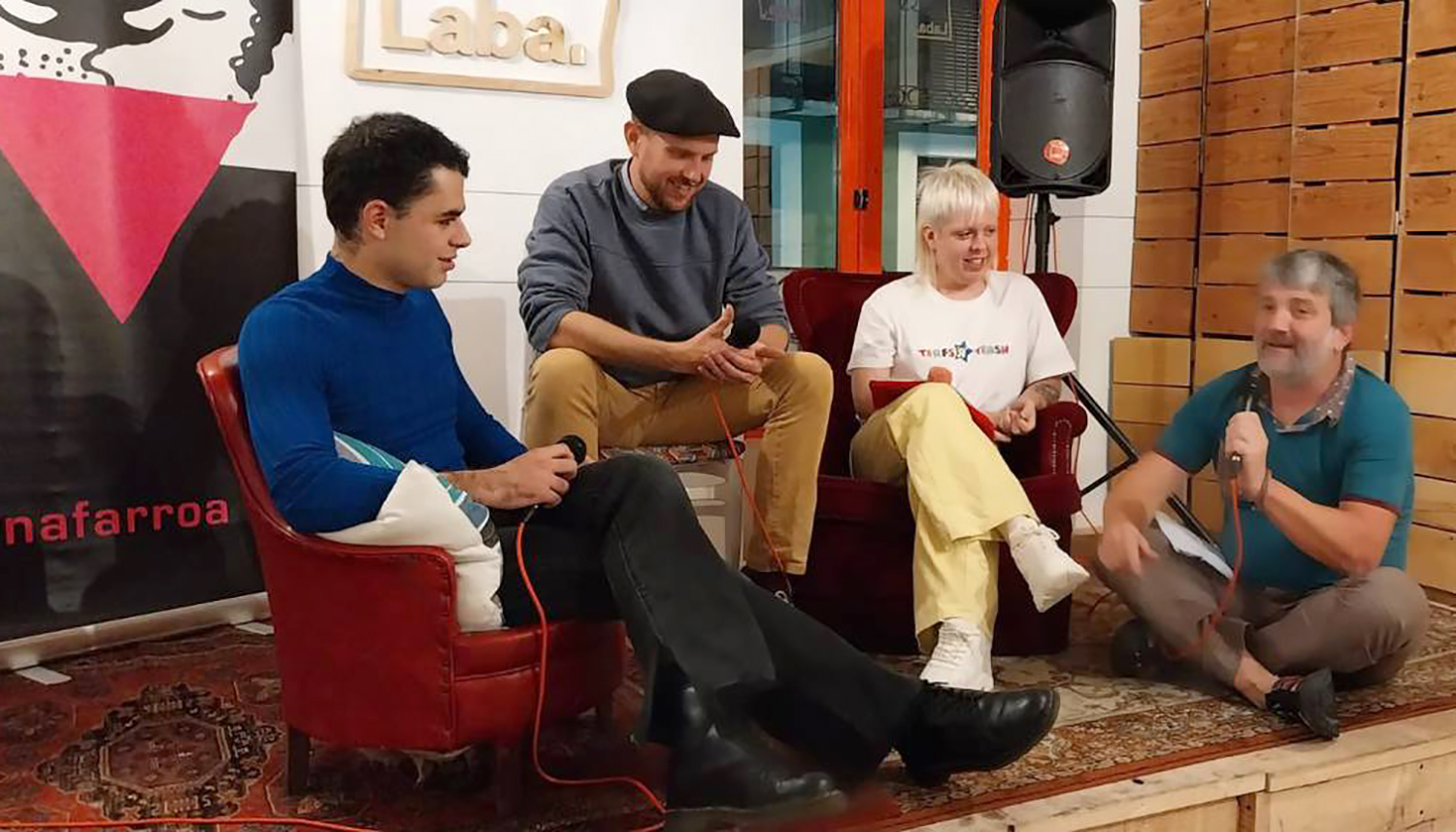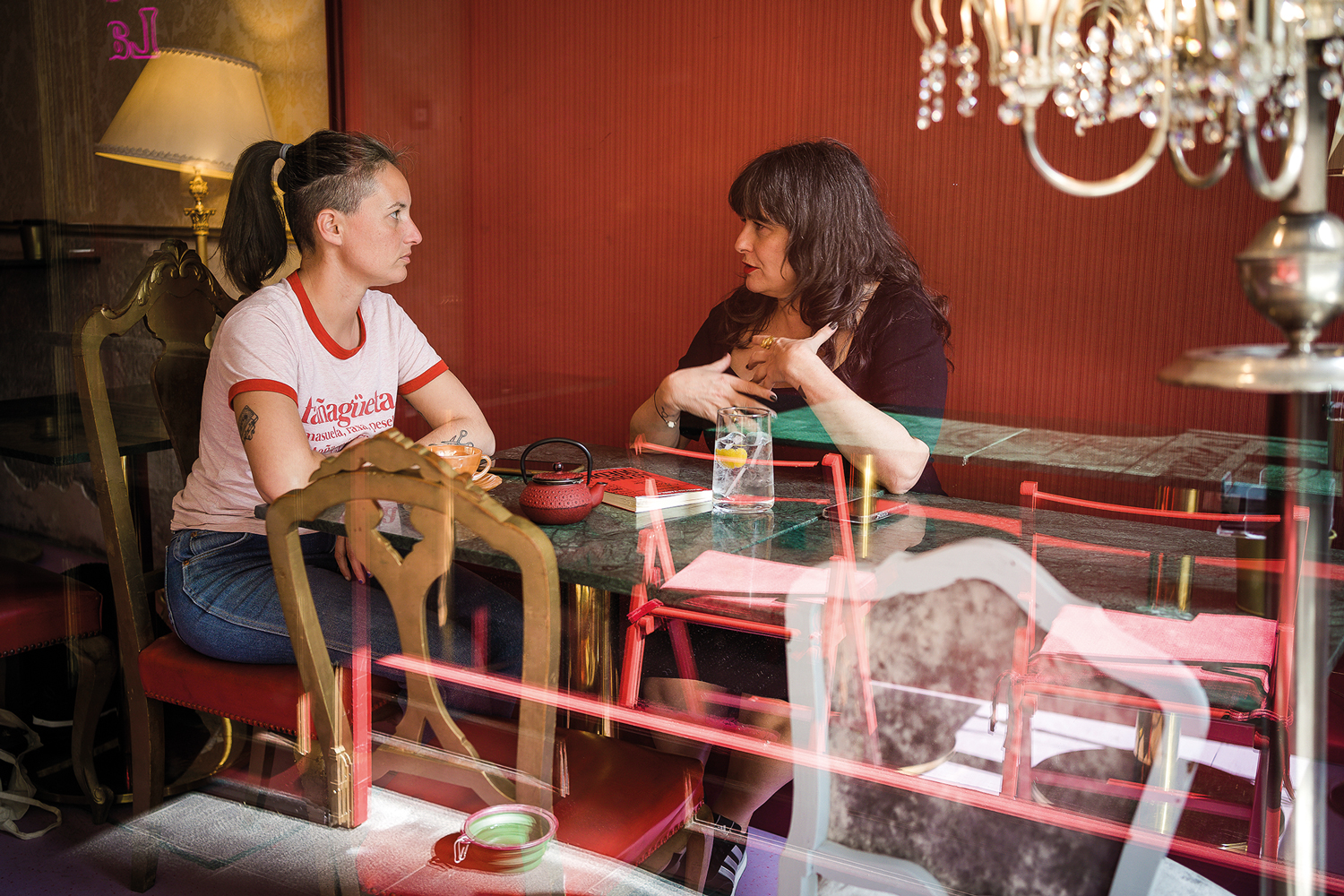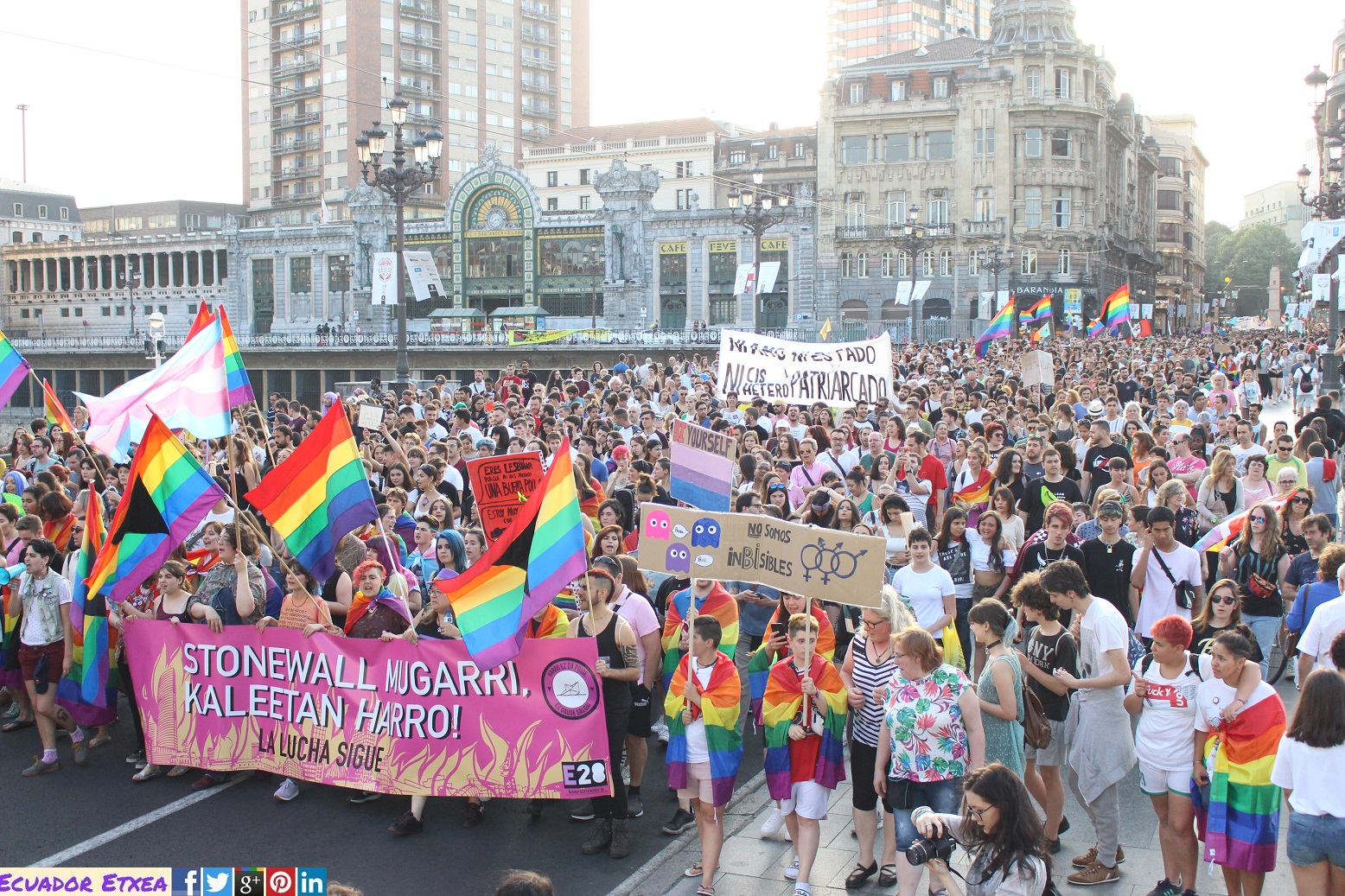Reflections on gender dissidents, non-heteronormalized culture and the importance of language
- The Ehgam cycle, which reinvents the Basque Country’s Sexual Liberation movement, brings together new people and prepares a joint roadmap, had its great day on 6 November. The self-managed space Karmela in Bilbao has hosted a working day throughout the day. Here's the chronicle of the day.

Gender dissidents
At the round table on gender dissidents, Josebe Iturrioz spoke about the role of feminism in the LGTB movement and in the community and the current situation. Iturrioz, with a long history in feminism, has been former member of the transfeminist group Medeak and technician in Equality of Women and Men of Women. In particular, he told us about the trajectory of feminism, the most interesting moments lived with the Medeak group, uniting feminism and transmaribollo struggles. At the same time, it has a vision of what we have gone back in the current situation for decades. In his opinion, a hegemonic feminism with great power has phagocyzed for years the discourses, proposals and alliances that have been worked on activism and on the street to put on the table a reductionist and essentialist approach in its place. In addition to the issues of gender dissent, he told us about the strength that currents have taken, such as abolitionism and the connection of these discourses (trans exclusionaries, abolitionists) with each other.
Later, Brayan Altimasberes was a member of the trans adult Loratuz association. Altimasberes explained the situation of the current laws, making a position on the situation both at the state level and in Hego Euskal Herria. Although he mentioned the question of trans law, it was very important to question the rights that we consider won today. For example, the discrimination suffered by trans people in public health. On the one hand, he explained that a diagnosis is still necessary in order to be legally recognized as a trans person. On the other hand, he stressed that the Gender Identity Unit of Cruces is the only specialized unit for trans people in the CAV, and that it has too long waiting lists.
According to Luque, it is often seen as a repudiated subject to every subject with a dissident gender expression also in LGTB spaces*. The only possibility of expression is often a spectacle for transvestites
In addition, he clarified that the hormones that are prescribed are made for cis people and are not intended for trans people, so there are still no known possible long-term side effects. He also mentioned other models of interest at the state level: the Transit service of Catalonia, which puts the decisions, needs and times of trans people at the center.
Then Ibai Luque talked to us about transvestism. He criticized the power relations that occur within the LGTB collective and gave us many keys for reflection. He emphasized that within the group, the situations, exclusions and risks suffered by transvestites are not given importance, or at least is not understood as a central theme. He also pointed out that it is difficult to find safe spaces and that every subject with a dissident gender expression in LGTB spaces is often seen as a repudiated subject. The only possibility of being and expressing oneself is usually the spectacle for the transvestites, and outside of it their experiences are not taken into account.
At the round table, Eneko García was the last to take the floor. The Pamplona artist and activist Drag is a non-binary person who practices transvestism. Garcia also told us about travestism, but in this case focusing on the show. He spoke to us explicitly of the political character of Drag, which is an action that breaks with gender norms.
On the other hand, he also pointed out that capitalism makes use of Drag artists. And most of all, nowadays people who gain visibility are white men, especially those who practice a very hegemonic femininity. Finally, he stressed that from power there is a very simple reading of the expressions of gender and that everything is taken to the masculine or feminine end, saying that the examples that are out of it are still more invisible. For example, the Drag King, to whom there is still a lot of resistance. That is, the resistance to making visible the masculine expressions of people read as women.
AMETS Jordan Arrieta dynamized the activity, established a link between the themes and opened some avenues for reflection before starting with the space of questions. He talked about the neoliberal reading of queer theories as an attempt to cover up the political character of the original theories, so that essentialist currents gain strength. He therefore stressed the importance of these flows in the struggle for the rights of trans people. To round off her interlocution she mentioned the motto that reflects well the constructed character of the genre: "We've all been born naked and everything else is a drag expression."
When opening a space for debate with the public, an interesting reflection on gender manifestations was proposed. One person commented that for the first time he realized the Drag (or performative) character of his expression and wondered why he showed himself as a sample. Luque responded to this by saying that they are often self-protective mechanisms and that, according to Iturrioz, the important thing is the revolution you want to do next to who and taking care of who.
Many reflections and ideas were raised at the table that would be woven with the rest of the day, shaping the ideas for the redream process.

Non-heterogeneous culture
At this table we had the opportunity to talk about the situation of non-hetero-regulated culture in the Basque Country, sharing their experiences, conclusions and opinions.
Danele Sarriugarte Mochales is a translator and writer, and is also an interviewer and speaker. Arrate Hidalgo Sánchez is a translator, editor, critic and disturbing of culture, both abroad and in the Basque Country. Kepa Errasti Gorroño is an actor, screenwriter and screenwriter. Oier Zuñiga is an actor and illustrator of Pérez de Urabain, has worked on different theatrical projects and has also created images of publications and posters.
Sarriugarte and Hidalgo spoke to us about their experience as writers and Errasti and Zuñiga spoke to us about the world of interpretation. And the conversation continued through various questions. First, they were asked whether a reflection has been made on the non-hetero-regulated culture and whether it exists. In general, everyone agreed that we can find some examples and references in the Basque area, but above all that we collect them from the United States and that there is no specific articulated or heteronormalized culture. Sarriugarte has given you some examples of its scope, such as the book Gender Exercises or the performance of the closet Ez dok. Errasti, for his part, mentioned the play Lur theater, the film 80 egunean or the festival Zinegoak, among others.
Secondly, they talked about the need for a subculture and the possibilities for it to be a Basque subculture. Zuñiga and Hidalgo stressed that the Basque culture is already a subculture in itself, although many times we do not realize it, and that a challenge is to articulate a LGTB subculture* within it. In fact, Zuñiga believes that it is important that the collective has spaces or means to share their representations and values. In addition, Sarriugarte insisted on the need for spaces to get out of the industry's logic and consumption model (e.g., barefoot verses). According to Errasti, the heterosexual view of most creators in the theater world limits the representation of LGTB people*.
The Basque culture is already a subculture as such, although we often do not realize it, and a challenge is to articulate an LGTB subculture* within it.
In relation to this, the following question asked the participants about the use of LGTB people*, especially in the world of interpretation. Here, Errasti and Zuñiga joined what was said, that is, that there are few representations and that do not have centrality in the plot of stories/scripts. And Zuñiga added that the LGTB* characters tend to be, normally, to pay the odds or to make “story-twists.” On the other hand, and focused on the literary dimension, Hidalgo sees more than a closet a curtain of a probaleku. I mean, if you have to go out again and again. Because there is a silence or a subtle invitation to say nothing.
As for the spaces, Hidalgo y Sarriugarte has been asked about feminism, to what extent it has been an umbrella to work more freely in their experience. In the opinion of Sarriugarte, although he values all the achievements obtained, in the current situation he becomes poor with the excuse of feminism as an opportunity in the literary world. In most cases it is a question of quotas and sees the need for direct policy and other alliances. In the case of Hidalgo, feminist science fiction gave her the opportunity to meet LGTB* people in the world of literature, although she does believe that the word "feminism" is often used as a wildcard in the current context.
As a final question, they were given a dream exercise, that is, what they would like the cultural landscape to be soon and what they would like it to be launched. In the case of books, Sarriugarte again insisted on the need to get out of the logic of consumption and create opportunities to share through reading groups. Errasti made it clear: he wants a marica Indiana Jones that doesn't have to be justified. Zuñiga addressed the issue of feminism and referred to the positive changes that this has entailed in the cultural sphere. Therefore, it considered necessary to build bridges and alliances with feminism. Hidalgo referred to the need to turn individualism and competition between equals, assuming as important the articulation and organization of things.
Finally, the possibility of asking open questions to the public, although different themes emerged, was discussed above all about feminism and the importance of creating alliances with it. Insisting that, in order to pave the way for the aforementioned issues, we can take models emerging from feminism.
In short, many issues were discussed throughout the conversation, but in general there was talk about the need to work with each other, the importance of culture from activism and the steps that can be started in the near future.

LGBT+ in Basque and Basque: debate about the presence of the Basque in our struggles
The day also served to reflect on the relationship between Euskera and sexual liberation. And “LGBT+ from Euskera and Euskera: discussing the place that Euskera has in our struggles” was not a mere round table, although it began. The first stones were placed by Raúl López Ekai and Imanol Miner Aristizabal. Both are activists linked to Ehgam, one from Pamplona and the other from Errenteria, who have put their share in the sexual liberation movement. Ehgam's historical perspective was the basis for helping to analyze Ehgam's relationship with the Basque country from the watchtower of time. To travel in time, they also used stickers and posters that have been so necessary for the movement. Among the ideas mentioned above, the need to look from the perspective of the commitment around the Basque country: each moment has established a special context to the situation of the Basque country and to the way in which the commitments have been made in its favor.
After the presentation, three colleagues opened the doors of their experience in a very generous way. In fact, the linguistic biography of each, like that of peoples, has their wounds, their pains and their knots. We are therefore talking about linguistic changes, about politicising and moving to the front line what was once a second order for oneself, or about confirming the value of what has always been important.
Izaskun Aranbarri has been dancing around the Basque world for years, but it has not been his only dance. He has told us about the experience in the Bolero environments of Bilbao, which could have felt the scarce presence of the Basque Country and the experiences lived in the maternal Bollillo, all related to the language. In her opinion, in many moments and spaces she has become more difficult to be Basque than to be a lesbian mother, and she reminded us that the influence that the contexts have on it must be taken into account. He also talked about the discomfort generated by the Basque (and the one speaking Basque). That is, the ability of our language to break the linguistic hegemonic normalcy.
In the Basque LGTB* environments, the difficulties that people have to feel like partners, and the difficulties that we have to live in Basque in the LGTB* environments were often mentioned.
On the other hand, the feminist journalist June Fernández, based on her biography, analyzed the relationship between Euskera's attitude, knowledge and use with gender issues and the need to explore the bridges between sexual liberation, feminism and Euskalgintza. In fact, as the political issue is that of the Basque Country, it is essential to learn from the contributions of each movement. What relationship is there, for example, between the respiratory centers of the Basque Country and the “environment” spaces that are inhabitable for LGTB communities? How to act when the watchtower of the linguistic privilege of those who use the hegemonic language wants to bet on the Basque language? He also presented us with the project “Nola izan izan/esan bollera”, which is underway between different activists and prison groups.
Then, Javi Guadaña, who has long been immersed in anarchist Marica activism, explained his path to Euskera, from Extremadura until his arrival in Bilbao. She lives in Bilbao about 7 years ago and has worked in the Intifada Marika group, as well as in the coordinator of 28 June and Harro! On the platform, which is aware of the importance of Euskera in militancy and puts it at the forefront. According to Javi, the anarchist gaze made him reflect on linguistic oppression and helped him become aware of his privileges. And in particular, he talked about the new relations he can build thanks to the Basque Country with its militants, how he has just reached the Basque Country and how they cross over to the Basque Country of another country.
After these historical locations and testimonies, several of the attendees took the microphone and told their opinions and experiences, as well as the changing conditions we have to live in Basque in different places in the Basque Country. The difficulties that LGBT people have in feeling partners in Euskaltzales environments, and the difficulties that we have in living in Euskera in LGTB environments*, even in the most complicated situations, through Euskarafobas aggressions. They also mentioned how the Basque country builds our identity and how it intersects with other circumstances and characteristics. There was no lack of interesting input and the conversation remained open during rest, dinner and probably at night. For Ehgam of the future and for the sexual liberation movement, in general, it has been an essential reflection on the Basque Country, of those who put ideas and stimulate action.

Rearming the sexual liberation movement: 3, 2, 1... Ehgam!
Finally, a 3.1... Ehgam! We had a participation session in which we were appointed as such. There we were able to dream about the lines of work, the forms of organization and the models of activism that the future Ehgam must have.
Turning to the reflections and ideas that, in some way, Ehgam could make to think, dream... We have the help of the members of the Joxemi Zumalabe Foundation. The program of participation and reflection that they raised allowed us to draw how we imagined the Ehgam of the future.
We started dreaming about the front pages of the newspapers of the future. What leaders do we dream of as a triumph of the sexual liberation movement of the future? So we put all these dreamlike scenarios on paper and it was a nice start to rethink the lines of work and the struggles of the future. We dream of diverse headlines, from sabotages and vindictive actions, through the elimination of some structures of the system and creating communities based on their own and free life models.
The dynamics of newspaper headlines allowed us to address the following personal reflection. In fact, in this second part, it allowed us to think about the lines of work, the concrete initiatives, the alliances, the frequency and forms of organization and association that the future should have Ehgam. We also had the opportunity to share the proposals and reflections of each in small groups.
We were at ease sharing each other's ideas and dreams. The passions and the desire to dream and build a prosperous future were evident. In this way, we anticipate that later on there will be more sessions to continue working on the ideas and proposals contained in this session.
As a second session of Ehgam’s redream process, we have set out different options so that, in the event of an inability to go to one, there is an opportunity to go to another. These are the dates and locations of the second session:
10 December, at 18:00, in Orereta (place to be confirmed)
11 December, at 17:30, in Izarra (Casa de Cultura)
11 December, at 17:30 pm, in Bilbao (Karmelan)
Finally, and in conclusion to the Ehgam redream process, we will hold a general meeting all day, on 15 January in Vitoria-Gasteiz (a place to be determined).
We also invite those who have not participated in the first session of the Ehgam ratification process. Encourage yourself to revive and rearm Ehgam!
* Ehgam Berramestuz initiative






















